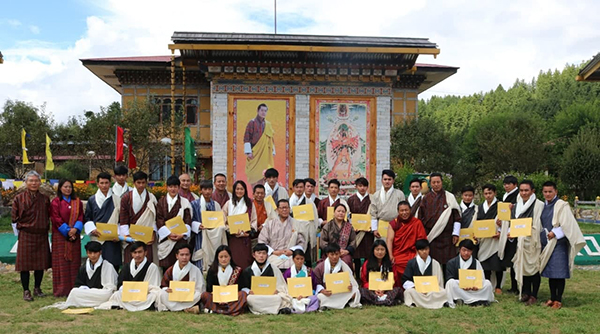 Technical Training Institutes (TTIs) across the country could soon replace their current teaching modality with the Dual Training programme. Through the programme, trainees spend almost the entirety of their two-year course outside the institute working with partner companies. The programme was successfully piloted at the Chhumig TTI in Bumthang. The first batch of 27 trainees completed their two years under the Dual Training method recently.
Technical Training Institutes (TTIs) across the country could soon replace their current teaching modality with the Dual Training programme. Through the programme, trainees spend almost the entirety of their two-year course outside the institute working with partner companies. The programme was successfully piloted at the Chhumig TTI in Bumthang. The first batch of 27 trainees completed their two years under the Dual Training method recently.
Except for the first six months of theory classes at the institute, the trainees spent the rest of the course working with the institute’s partnering companies such as the Construction Development Corporation Limited (CDCL) and the National Housing Development Corporation Limited (NHDCL).
At the graduation ceremony, the NHDCL announced that they are employing the top three graduates that trained with them.
Pema Dorji is one of the three graduates who got selected by the NHDCL. He says all his coursemates have also been employed by other companies. He added it would be helpful if the partner companies could also provide some remuneration to the trainees. “It would benefit the trainees if they could provide us with a stipend because some of the trainees have to cook on their own and they hardly get time to do that. Moreover, it is difficult for us to meet our expenses with the stipend our institute provides,” he said.
Another graduate Samdrup Zangmo said the programme adds to their employability as they get real-world experience. “It also improves our interpersonal relationship and life skills.”
The Helvetas Swiss Intercooperation office in Bhutan is supporting the first three batches of the programme. The office pays Nu 5,000 monthly for each trainee while the government provides a stipend and DSA of Nu 4,200.
The programme will begin in other TTIs across the country by next year. Pema Tshering, the Principal of the Chhumig TTI said the programme is already tried and tested in several other countries. “The Dual Training Programme is a huge success in countries such as Germany, the Philippines and Malaysia, so we tried this in our country as well,” he said. “From the first batch, we have had positive outcomes that indicate that the implementation of the programme would be successful in all the institutes.”
The partner companies also shared positive feedback on the programme. “As Vocational Training Institutes in the past, the entire two-year course was mostly training but through this new programme, the trainees work with us and they become ready for employment once they graduate. This is beneficial for us as well,” said Tenzin, a manager at the NHDCL.
The Technical Education Department will review the programme before it is implemented in TTIs across the country.
Kipchu, Bumthang
Edited by Yeshi Gyaltshen




